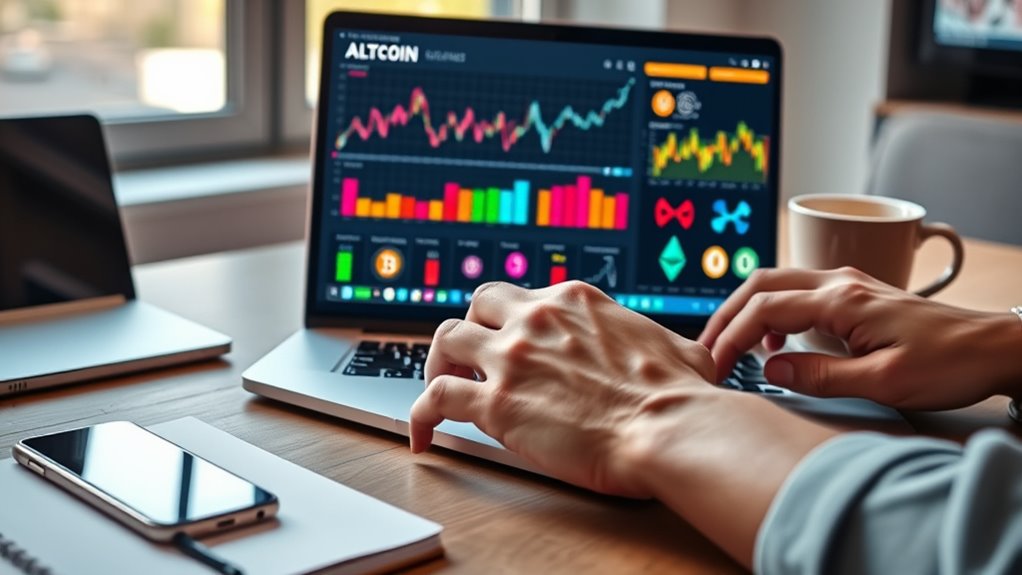To buy altcoins safely as a beginner, start by choosing reputable exchanges with strong security features and positive reviews. Verify the authenticity of the coins and do thorough research on the project and developers. Secure your accounts with strong passwords and two-factor authentication. Use trusted wallets, preferably hardware, for storing your assets, and keep private keys offline. Stay cautious of scams and always stay updated on market risks; continuing your exploration will help you stay protected.
Key Takeaways
- Choose reputable exchanges with strong security features and positive user reviews.
- Verify altcoin projects through whitepapers, transparency, and developer credibility.
- Use secure wallets, preferably hardware, and keep private keys encrypted and backed up offline.
- Enable two-factor authentication and avoid sharing private keys to protect accounts.
- Research markets and community activity to avoid scams and confirm genuine investor interest.
Choosing Reputable Cryptocurrency Exchanges

When selecting a cryptocurrency exchange, it’s essential to choose one with a solid reputation for security and reliability. You want a platform that has a proven track record of safeguarding user funds and personal information. Look for exchanges with strong security features like two-factor authentication (2FA), cold storage options, and regular security audits. Check user reviews and industry ratings to gauge trustworthiness. Avoid platforms with a history of hacks or complaints about withdrawal issues. A reputable exchange should be transparent about its operations, fee structure, and regulatory compliance. Additionally, it’s wise to verify whether the exchange complies with local laws and regulations to ensure legal protection and reduce potential risks. Incorporating security assessments and understanding the risk assessment processes can further help you evaluate the safety measures of the platform. Conducting comprehensive background checks on the exchange’s history and management can also reveal potential red flags. By choosing a well-regarded exchange, you reduce the risk of fraud or loss, creating a safer environment for your altcoin investments. Remember, your choice of exchange markedly impacts your overall security. Incorporating efficient general ledger coding practices into your financial management can also help you keep track of your investments more effectively.
Setting Up Secure Accounts and Authentication

To protect your altcoin investments, it’s essential to set up your accounts with strong security measures from the start. First, use a unique, complex password for each exchange or wallet account, avoiding common words or personal info. Second, enable two-factor authentication (2FA) to add an extra layer of security; apps like Google Authenticator or Authy are recommended. Third, review security settings regularly and stay updated on platform security alerts. These steps ensure unauthorized access is minimized and your assets remain protected. Additionally, essential security practices such as regularly updating your device software can further strengthen your defenses. Maintaining awareness of industry trends helps you adapt your security measures over time. Remember, strong authentication practices are crucial, especially given the irreversible nature of blockchain transactions. Taking these precautions safeguards your investments and helps prevent potential theft or hacking. Ensuring your security measures remain current and up-to-date can prevent vulnerabilities. Incorporating cookie management can also enhance your online security by controlling data sharing and tracking. Staying informed about sneaker culture innovations and other emerging trends can help you recognize new security considerations related to digital assets. Securing your accounts now saves you headaches later.
Verifying the Authenticity of Altcoins
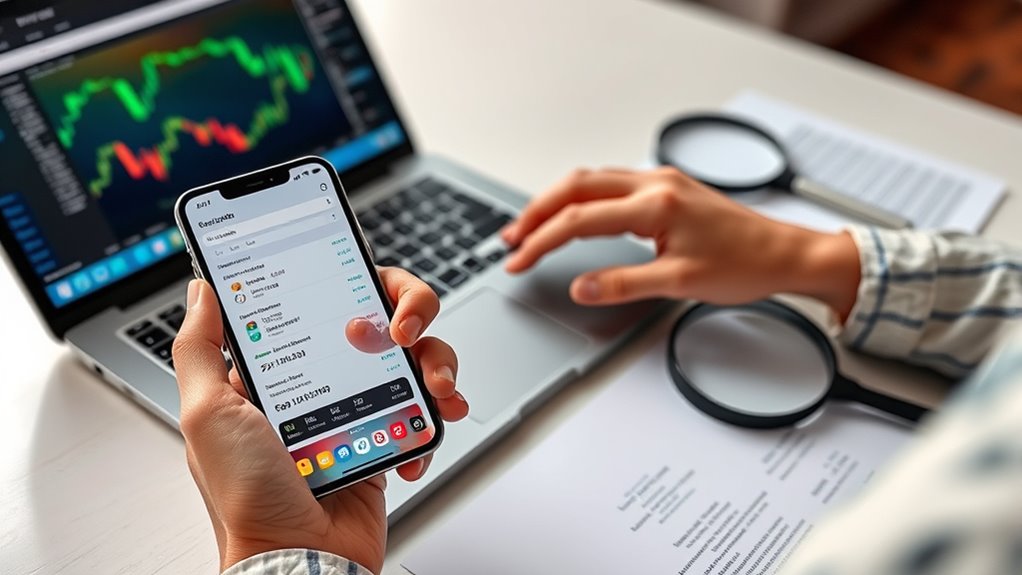
To verify an altcoin’s authenticity, start by reviewing its whitepaper to understand its purpose and technology. Confirm that the developers are transparent about their team and project updates, and check for active community engagement. These steps help guarantee you’re investing in a legitimate and well-supported altcoin. Additionally, examining self watering plant pots can provide insights into sustainable and reliable systems, similar to trustworthy altcoins. Ensuring the altcoin has clear financial terms and jargon can also help you assess its credibility and potential stability. Paying attention to the overall blockchain infrastructure is crucial for long-term security and reliability of the project.
Check Coin Whitepapers
Have you ever considered the importance of examining a coin’s whitepaper before investing? A whitepaper reveals the project’s goals, technology, and roadmaps. To verify its legitimacy, start by:
- Checking for clear, detailed technical explanations that demonstrate a solid understanding of the underlying blockchain or technology. Trustworthy sources can help confirm the accuracy of the provided information. Additionally, understanding the project’s fundamentals helps prevent falling victim to misleading claims. Incorporating transparency standards from reputable organizations can further support your assessment.
- Assessing the transparency of the team, including founders and advisors, to ensure accountability.
- Reviewing the project’s goals and roadmap for realism and consistency, avoiding overly ambitious or vague promises.
- Utilizing predictive analytics to evaluate potential project success based on historical data trends and market signals.
- Recognizing the importance of AI detection methods in verifying the authenticity of digital content, which can also be applied to scrutinize whitepapers for signs of authenticity.
A well-crafted whitepaper should provide transparent, extensive, and logical information. If it’s vague, poorly written, or overly promotional, it’s a red flag. Always do your due diligence by scrutinizing these key aspects before investing in any altcoin.
Confirm Developer Transparency
Verifying developer transparency is essential because it helps you determine whether the project’s team is credible and accountable. You want to ensure developers openly share their identities, backgrounds, and goals. Look for clear information on their websites or social media platforms. Support hours transparency indicates a lower risk of scams and increases trustworthiness. Checking Ice Cream Recipes for creativity and consistency can be analogous to assessing the reliability of a project’s development team. Additionally, evaluating the detailed information about developers can provide insights into their expertise and commitment. Understanding the User Privacy and Cookies practices of the project can also inspire confidence, as familiar and well-established practices often reflect stability and reliability.
Analyze Community Activity
How can you tell if an altcoin’s community is genuine? Look for active engagement across multiple platforms like Reddit, Twitter, and Telegram. Consistent participation, thoughtful discussions, and real user interactions indicate a healthy community. Avoid communities dominated by spam or overly promotional posts, which can signal manipulation. To analyze community activity effectively, consider these points:
- Frequency of Posts and Comments: Regular activity shows ongoing interest and support.
- Quality of Interactions: Insightful questions and helpful responses suggest knowledgeable members.
- Community Leaders and Moderators: Transparent, responsive leaders help maintain authenticity and curb manipulation.
- Operating Hours of Related Stores: Understanding the hours of local stores can help in planning community meetups or events to verify community engagement offline. Additionally, examining the market capitalization and trading volume can provide insights into the altcoin’s stability and genuine interest from investors.
- Recognizing the presence of narcissistic behaviors within community interactions can also help identify whether the community is authentic or dominated by individuals seeking attention or manipulation. Moreover, reviewing the use of official communication channels can reveal how transparent and organized the community is, which is crucial for assessing its authenticity.
Using Secure Wallets to Store Your Assets
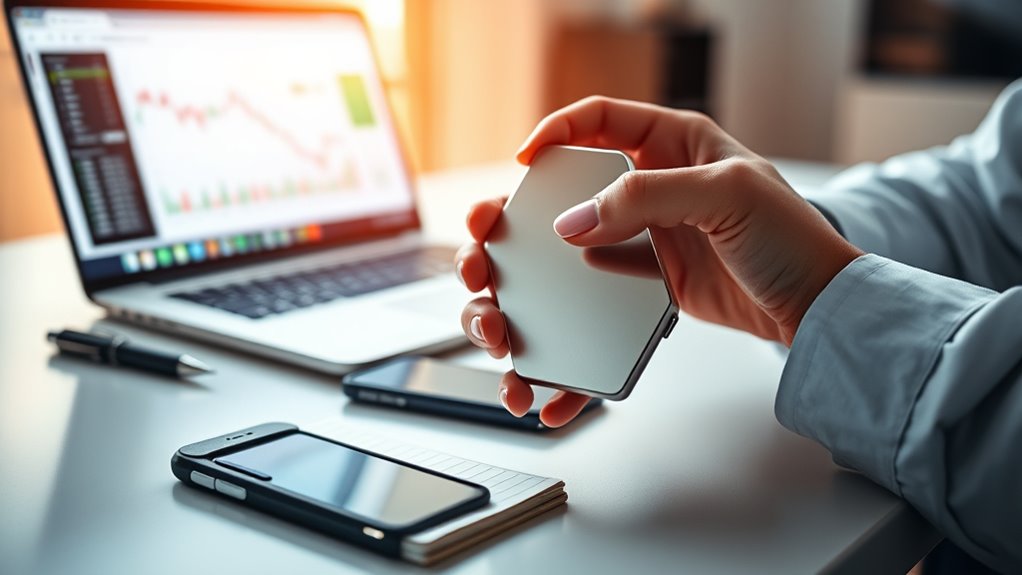
Choosing the right wallet is essential for keeping your altcoins safe, whether you opt for hardware, software, or paper options. You must also secure your private keys carefully to prevent unauthorized access. Additionally, implementing backup strategies guarantees you can recover your assets if something goes wrong.
Types of Wallets
To keep your altcoins safe, selecting the right type of wallet is essential. Different wallets offer varying levels of security and convenience.
- Hardware wallets: These are physical devices that store your private keys offline, making them highly resistant to hacking. They’re ideal for long-term storage and large holdings.
- Software wallets: Applications on your computer or mobile device, offering quick access and ease of use. They’re suitable for daily transactions but can be vulnerable if your device is compromised.
- Web wallets: Online platforms accessible via browsers, providing convenience but exposing you to potential hacking risks. Use these cautiously and avoid storing significant funds on them.
Choosing the right wallet depends on your security needs and how frequently you plan to trade.
Securing Private Keys
Securing your private keys is a vital step in protecting your altcoins. Your private key grants full access to your funds, so keeping it safe is essential. Use secure wallets, such as hardware wallets or reputable software wallets with strong encryption, to store your keys. Never share your private key or store it in plain text or online platforms vulnerable to hacking. Consider generating your private keys offline, on a device disconnected from the internet, to prevent malware or cyberattacks. Keep your private keys in a secure location, like a safe or encrypted digital storage, and avoid leaving them on cloud services or unprotected devices. Properly securing your private keys ensures you maintain control over your assets and reduces the risk of theft.
Wallet Backup Strategies
Using secure wallets to store your assets is a crucial step in safeguarding your altcoins. To protect your investments, you must implement effective backup strategies. First, always create multiple copies of your private keys or seed phrases and store them in separate, secure locations. Second, consider using hardware wallets with built-in backup features that allow you to recover your funds if the device is lost or damaged. Third, regularly update your backups and verify their integrity to confirm they remain accessible and uncorrupted. By following these strategies, you minimize the risk of losing access to your assets due to hardware failure, theft, or accidental damage. Proper backups are your safety net, ensuring your altcoins stay protected regardless of unforeseen events.
Avoiding Common Scams and Fraudulent Schemes
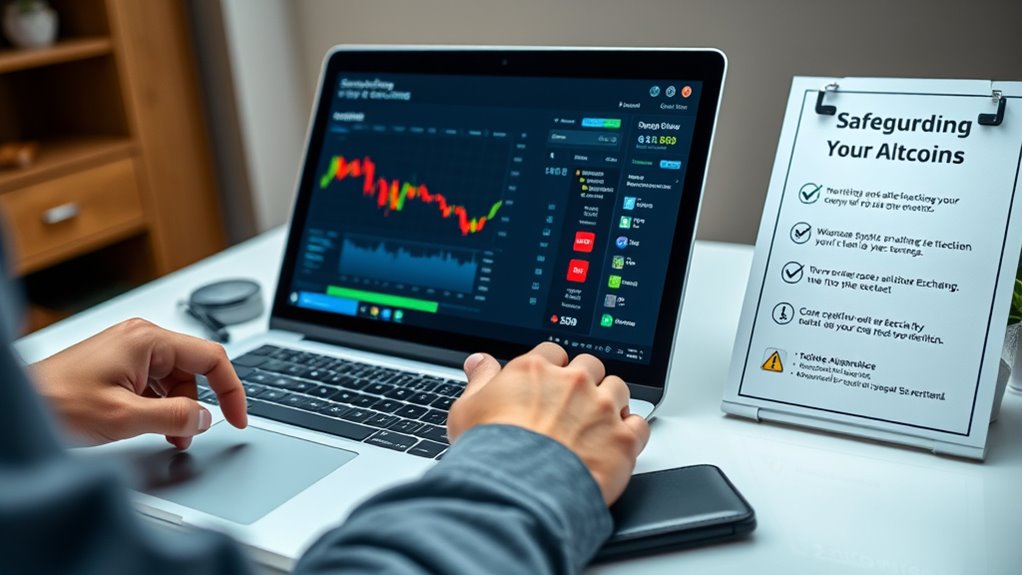
Avoiding common scams and fraudulent schemes is essential when buying altcoins, as the crypto space is rife with tactics designed to deceive unwary investors. Always verify the legitimacy of exchanges before making transactions. Use official websites and double-check URLs to avoid phishing sites. Be cautious of offers that promise guaranteed returns or seem too good to be true—they often are. Never share your private keys or seed phrases, even if someone claims to be from support. Avoid clicking suspicious links or downloading unknown software. Research the project thoroughly, including its team and community feedback. Trust reputable sources and seek reviews from experienced users. By staying vigilant and applying common sense, you reduce your risk of falling victim to scams and protect your investments.
Staying Informed About Market Risks and Best Practices
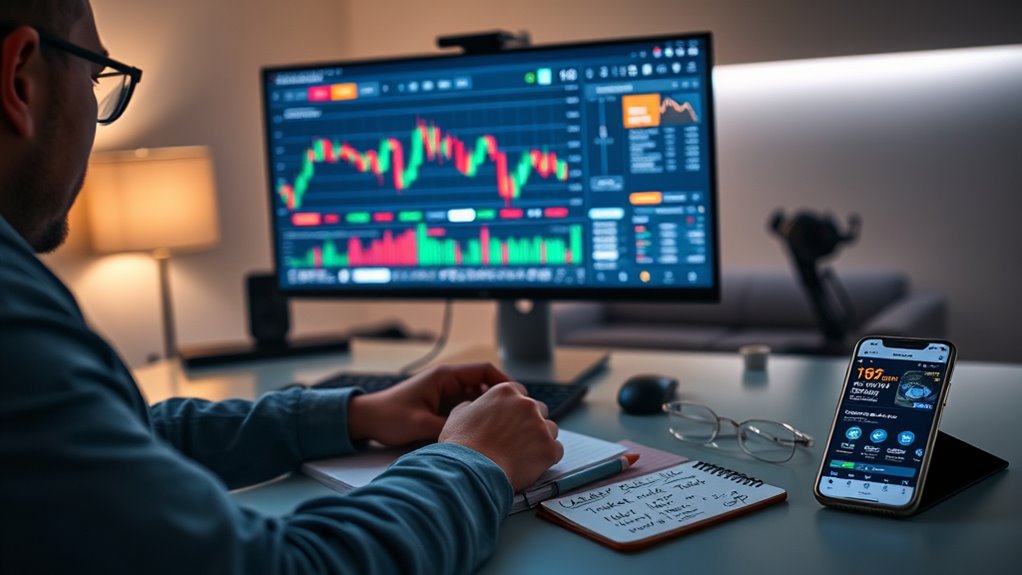
Staying informed about market risks and best practices is essential for making smart investment decisions in the volatile world of altcoins. You need to keep up with news, trends, and regulatory changes that could impact prices or security. Being proactive helps you avoid costly mistakes and seize opportunities. To deepen your understanding, consider these key actions:
- Regularly follow reputable crypto news sources and analysis platforms.
- Understand market indicators and how they reflect overall sentiment.
- Stay updated on security protocols and platform policies to protect your assets.
Frequently Asked Questions
How Do I Evaluate Altcoin Project Teams and Development Teams?
When evaluating altcoin project teams and development teams, you should research their backgrounds, experience, and past projects. Look for transparent communication and active community engagement. Check if the team is open about their goals and updates. Review their GitHub or development repositories to see recent activity. Trust teams with credible credentials, a solid roadmap, and a reputation for delivering updates, which indicates reliability and strong project potential.
What Are the Legal Considerations When Buying Altcoins Internationally?
Imagine crossing a border with a valuable package—you need to know the rules. When buying altcoins internationally, you must consider legal laws like import restrictions, tax obligations, and anti-money laundering policies. You should research each country’s regulations, verify your transactions comply, and use trustworthy platforms. Ignoring these rules can lead to fines or lost assets, so stay informed to navigate the global crypto landscape safely.
How Can I Identify Genuine Community Support for an Altcoin?
You can identify genuine community support for an altcoin by checking social media platforms, forums, and official channels for active, positive engagement. Look for transparent communication from developers, consistent updates, and a respectful community tone. Avoid coins with fake followers or overly promotional content. Genuine support shows real user involvement, helpful discussions, and a committed development team, indicating a trustworthy project backed by a strong, authentic community.
What Are the Tax Implications of Trading Altcoins in Different Countries?
Think of taxes as the invisible hand guiding your financial journey. You need to understand that trading altcoins can trigger different tax obligations depending on your country. Some nations see crypto gains as taxable income, while others treat them as property. You should research your local laws or consult a tax professional to avoid surprises, because what’s clear in one jurisdiction might be a hidden minefield in another.
How Do I Handle Lost or Stolen Altcoins Securely?
If your altcoins are lost or stolen, act quickly. Move your remaining funds to a secure wallet, preferably a hardware wallet, to prevent further theft. Report the theft to your exchange and local authorities if necessary. Enable two-factor authentication and update your passwords. Avoid sharing sensitive info and keep backups of your wallet keys offline. Staying vigilant helps protect your assets from future threats.
Conclusion
Just like a sailor navigates treacherous waters with a steady hand, you must stay vigilant in the crypto world. By choosing reputable exchanges, securing your accounts, verifying altcoins, and keeping your assets safe, you build your fortress against scams. Stay informed and cautious, for in this ever-changing market, wisdom is your compass. With these steps, you’ll steer confidently, turning the unpredictable tides of altcoins into opportunities rather than pitfalls.

